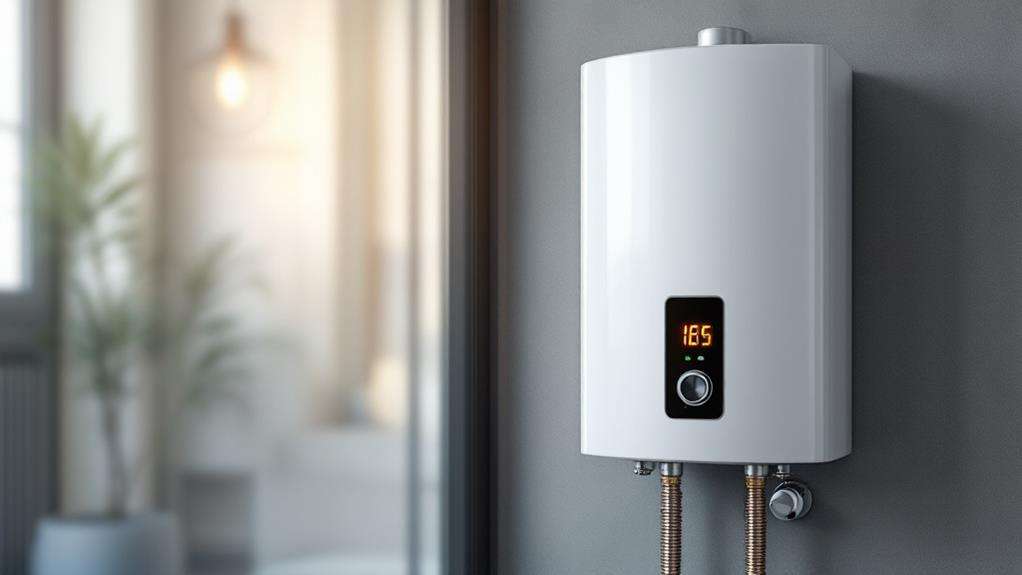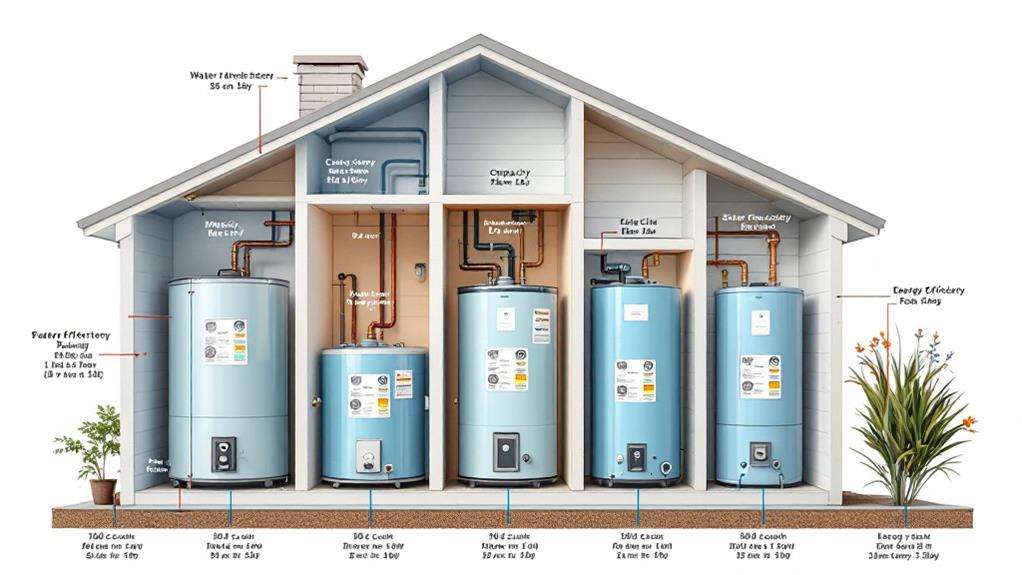The Ultimate Guide to Choosing the Right Water Heater for Your Home
Choosing the right water heater for your home starts with understanding your household's hot water needs. Consider your family size and usage patterns to determine the appropriate tank or tankless model. Evaluate energy efficiency ratings and fuel type to manage utility costs and environmental impact. Assess installation requirements like plumbing layout and electrical service to avoid costly upgrades. Size the heater correctly based on household size and hot water usage. Properly maintaining your water heater will ensure it operates efficiently and lasts. Continue reading to dive deeper into these key considerations and find the perfect water heating solution for your home.
Key Takeaways
- Assess the household's hot water usage patterns and size requirements to determine the appropriate water heater capacity and energy efficiency needs.
- Compare tank and tankless water heaters, considering factors like energy savings, space-saving benefits, flow rates, and upfront costs.
- Evaluate the energy efficiency and fuel type of the water heater to optimize utility bills and environmental impact.
- Examine the installation requirements, including plumbing layout, electrical service, and any necessary upgrades, to ensure proper and safe installation.
- Select the appropriate water heater size based on the number of people in the household and their daily hot water usage.
Understanding Your Household's Hot Water Needs
Your household's hot water needs are a crucial factor in choosing the right water heater. Consider your family's water usage patterns and size requirements to determine the appropriate size and capacity for your new water heater.
Larger households tend to require more hot water, so you'll need a heater with a higher capacity. Conversely, smaller households may do well with a more compact model. Think about your daily hot water demands, including things like showers, laundry, and dishwashing. If you have teenagers or a growing family, you'll likely need a more robust system to meet their needs.
Don't forget to factor in any future changes, too. If you're planning to expand your home or have more family members move in, you'll want a water heater that can accommodate those increased demands. By understanding your household's hot water consumption, you can select the perfect water heater to meet your current and future needs.
Comparing Tank vs. Tankless Water Heaters
When it comes to selecting a water heater, the choice between a traditional tank-based model and a tankless system is a crucial consideration. Tank heaters store a supply of hot water, while tankless units heat water on demand. Tankless heaters generally have a higher energy savings potential, as they don't continuously maintain a full tank of hot water. This can translate to lower utility bills. Additionally, tankless models are more space-saving, as they're compact and don't require a large storage tank.
However, tankless heaters may have a higher upfront cost. They also have limited flow rates, potentially unable to serve multiple hot water demands simultaneously. Conversely, tank heaters can handle higher-volume needs, though they're less efficient. Ultimately, evaluating your household's hot water requirements, available space, and budget will guide the best water heater choice - whether a traditional tank or a modern tankless system.
Evaluating Energy Efficiency and Fuel Type

Energy efficiency and fuel type are also key factors to consider when selecting a water heater. You'll want to assess the unit's energy efficiency, as this can significantly impact your utility bills and carbon footprint reduction. Look for the Energy Star rating, which indicates the heater meets strict energy efficiency guidelines.
Furthermore, the fuel type will affect the environmental impact assessment. Gas-powered heaters tend to be less expensive to operate but may have a higher carbon footprint. Electric heaters are generally more energy-efficient and environmentally friendly, but the operating costs can be higher. Tankless water heaters are known for their energy efficiency, as they only heat water on demand, but the upfront cost is typically higher.
Carefully weigh the trade-offs between energy efficiency, fuel type, and long-term operating costs to find the best water heater that aligns with your home's needs and your commitment to sustainability.
Assessing Installation Requirements and Costs
The choice of a water heater extends beyond energy efficiency and fuel type, as the installation requirements and associated costs merit careful consideration. You'll need to evaluate your home's plumbing layout, as the new water heater may require modifications to accommodate its size and connections. This could involve rerouting pipes or adding new fittings, which can quickly add to the overall installation costs.
Additionally, you'll need to assess whether your home's electrical service can handle the power demands of the new water heater. Many modern, energy-efficient models require higher-amperage circuits, necessitating electrical service upgrades. These upgrades can be costly, so it's essential to factor them into your decision-making process. Don't forget to consult with licensed professionals to ensure that the installation is done correctly and safely, as improper installation can lead to water leaks, fire hazards, or other issues down the line.
Selecting the Appropriate Water Heater Size

How do you determine the appropriate size for your new water heater? The size of your water heater is crucial, as it needs to meet your household's hot water demands. To select the right size, consider the number of people living in your home and their daily hot water usage. A general rule of thumb is to choose a tank size that can provide 10-15 gallons of hot water per person.
Additionally, think about the size of your home and the number of bathrooms, as this will impact your hot water needs. When selecting an energy-efficient option, look for features like high-efficiency burners, insulation, and tank size. Certain tankless water heaters can also be excellent energy-savers. Lastly, review the installation logistics, such as available space, power source, and venting requirements, to ensure a smooth and safe installation process. By carefully considering these factors, you can select the perfect water heater size to meet your household's hot water needs efficiently.
Maintaining and Prolonging Your Water Heater's Lifespan
Proper maintenance is key to prolonging the lifespan of your water heater. Regular maintenance, such as flushing the tank and inspecting the anode rod, can significantly extend its useful life. Don't neglect these essential tasks – they'll help prevent sediment buildup, corrosion, and other issues that can lead to premature failure.
While you can handle some maintenance yourself, it's also wise to schedule a professional inspection periodically. A qualified technician can identify potential problems and recommend any necessary repairs or replacements. They'll also ensure your water heater is operating safely and efficiently.
